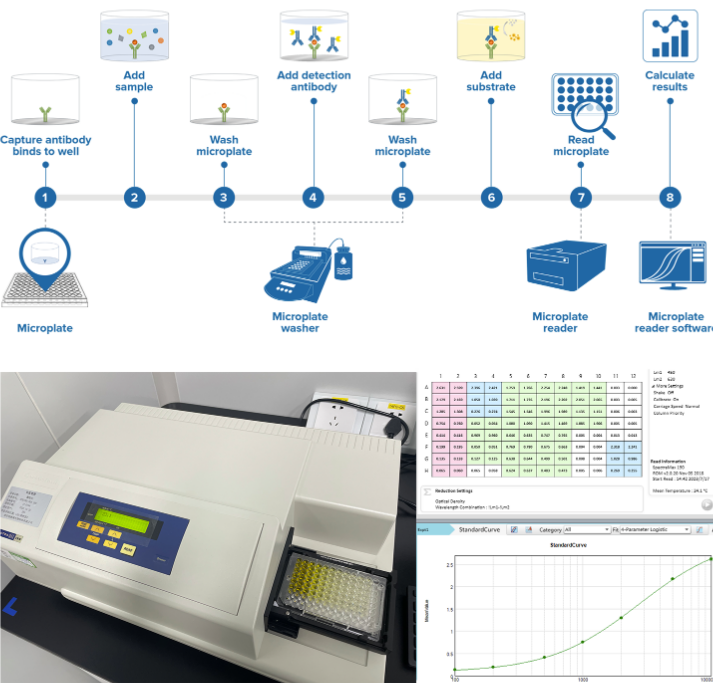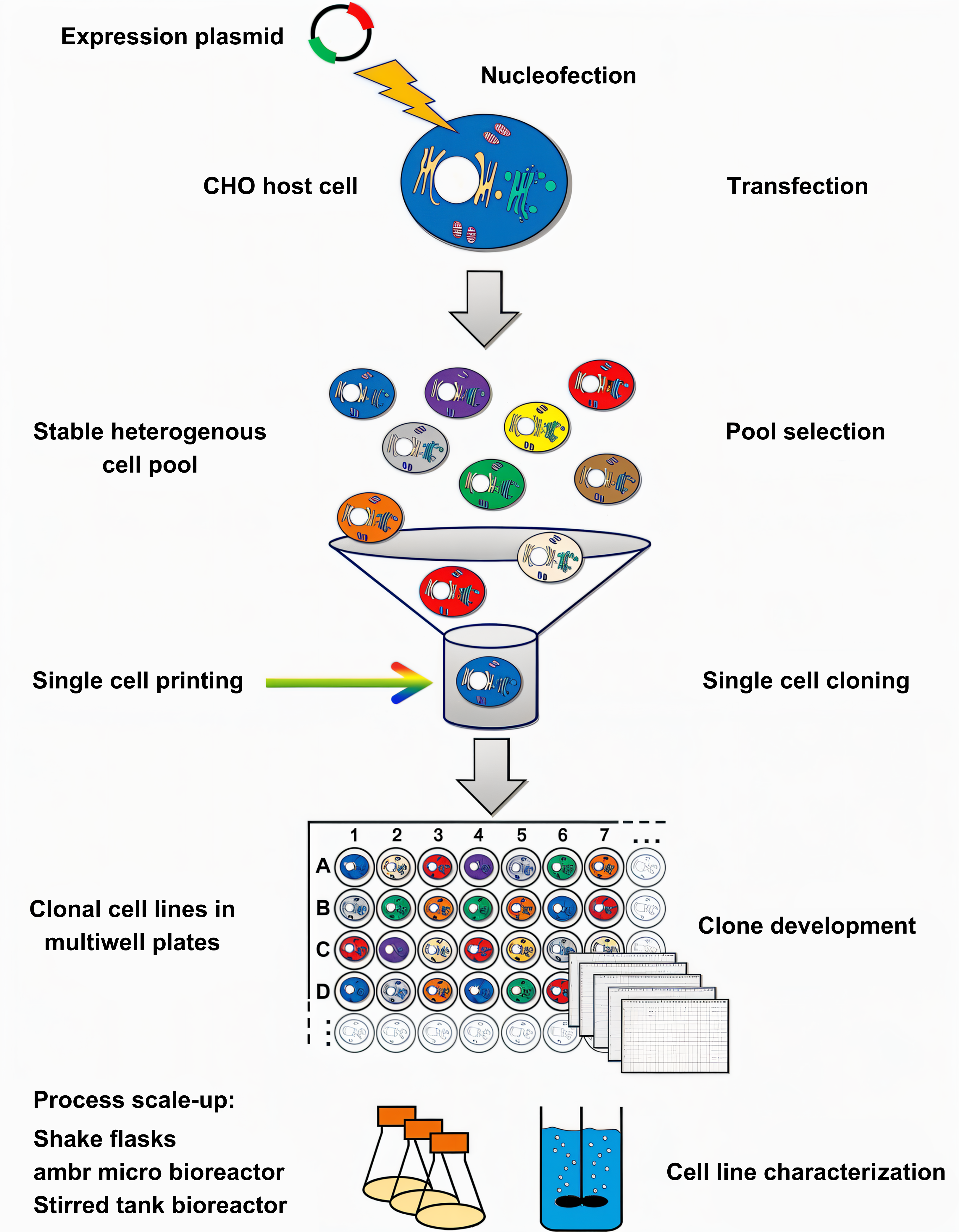Technical Platforms
High throughput nanobody screening technology platform
Phage display technology plays an important role in antibody engineering. By integrating the DNA sequence of foreign protein or polypeptide into the phage coat protein structural gene, it is expressed on the phage surface in the form of fusion protein, and through binding enrichment affinity screening, the antibody technology that specifically binds to antigen is obtained in vitro.
RegeneCore has established a unique nanobody screening technology platform by optimizing and upgrading the traditional phage display antibody library technology.

Humanized technology platform of nanobody
Nanobody is a unique small molecule antibody with high affinity, high specificity and high stability. At the same time, it also has the advantages that traditional antibodies do not have, such as small molecular weight, good tissue permeability in vivo, and it is very easy to cross blood vessels or tissues to reach the target site. It has prospects in the fields of therapeutic drugs, diagnostic reagents, scientific research and so on. So far, a variety of multivalent nanoantibodies have entered various phases of clinical research and been applied to cancer, autoimmune diseases, respiratory system, blood system and other diseases. With the deepening of research, more nano antibodies will be applied in clinic. However, if multivalent nano antibodies are used in clinic for a long time, they may produce different degrees of immune response and affect the therapeutic effect. Therefore, humanization of nano antibodies is an effective way to solve the problem.
The general principle of humanization of nanoantibodies is to ensure high affinity, activity, thermal stability and yield while effectively reducing immunogenicity. At present, the humanized methods mainly include chimerism, surface remodeling, reconstruction and chain replacement.
RegeneCore integrated advanced bioinformatics analysis methods and macromolecular structure modeling, and combined with the unique nanobody screening technology to build a nanobody humanized technology platform, which can quickly and efficiently select humanized nano antibodies with high affinity and high compatibility.

Antibody immunogenicity detection technology platform
Antibody immunogenicity refers to the recognition and response of the host immune system to therapeutic agents. When antibody immunogenic reaction occurs in patients using drugs, cytokine storm (CRS) or anti drug antibody (ADA) may occur in patients. Anti drug antibodies may neutralize therapeutic drugs, affect drug efficacy, and even further cause adverse reactions, affecting the safety and effectiveness of antibody drugs in clinical use.
In the process of drug research and development, the immunogenicity of early candidate antibodies can be evaluated in time, which can greatly reduce the risk of late antibody drug development failure. The platform can comprehensively evaluate the antibody after the transformation of RegeneCore humanized technology platform through experimental data, simulate and analyze the risk of CRS and / or Ada in clinical patients, so as to ensure the safety and effectiveness of drugs in clinical trials.

Source of picture:Kambayashi T, Laufer T M. Atypical MHC class II-expressing antigen-presenting cells: can anything replace a dendritic cell?[J]. Nature Reviews Immunology, 2014, 14(11): 719-730.

Biomacromolecule analysis technology platform
RegeneCore has a GLP like macromolecular bioanalytical platform to carry out the quantification and analysis of samples, which can provide biological sample analysis of preclinical / clinical research projects such as toxicokinetics (TK), pharmacokinetics (PK), pharmacodynamics (PD, mainly biomarkers), in vivo immunogenicity, etc. for mAbs, double antibodies, car-t, therapeutic vaccines and other biological products. At present, PD research has cooperated with nearly 100 projects, and has completed the development and validation of 100+ methodologies; The pk/ada study has completed the writing and implementation of SOPs that meet GLP specifications.

CMC process development technology platform for antibody drugs
CMC development of biomacromolecule drugs includes 14 modules, including drug evaluation, cell line construction, cell culture process development, protein purification, preparation process development, analytical method development, pilot production, etc. cell line construction, cell culture process and downstream purification process are the three key factors that determine the success or failure of the production of therapeutic antibody drugs.
RegeneCore has the ability to build a variety of host cell systems. By integrating a variety of technical platforms, it has built a stable cell line construction platform. According to the target sequence, it can rapidly build cell lines and obtain high-quality monoclonal antibodies, dual / multispecific antibodies and fusion proteins.
CMC upstream and downstream R & D platform has the ability to rapidly improve the yield and quality of expression products through culture medium screening optimization, culture process optimization, purification system screening, and product quality characterization analysis, supporting drug development to rapidly enter the clinical stage.

Pharmacodynamic technology platform
At present, RegeneCore has successfully constructed tumor models (including leukemia, breast cancer, ovarian cancer, bone marrow cancer, lymphatic cancer, pancreatic cancer, epidermal cancer, etc.), psoriasis models, specific dermatitis models and pulmonary fibrosis models, carried out 50 + pharmacodynamic experiments, and completed the construction of pharmacodynamic platform. Through the continuous optimization and upgrading of the drug efficacy platform, the in vivo efficacy of most early candidate molecules has been evaluated in a cost-effective manner, which has promoted the development of therapeutic drugs and accelerated the progress of preclinical drug development.

Source of picture:Thangaraj J L, Ahn S Y, Jung S H, et al. Expanded natural killer cells augment the antimyeloma effect of daratumumab, bortezomib, and dexamethasone in a mouse model[J]. Cellular & Molecular Immunology, 2021, 18(7): 1652-1661.
TEL:
Address: Room 07 Building 16 Treehouse, No. 73, Tanmi Road, Jiangbei New District, Nanjing
Enterprise email:rjk@regenecore.com

WeChat cooperative consultation
You are the th visitor

 025-58608860
025-58608860 

 Contact
Contact 